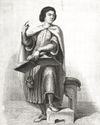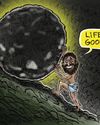
Can we know how things really are regardless of how they appear to us? Throughout history, many philosophers - known as skeptics - have argued that we can not. Part of what Immanuel Kant is attempting in his Critique of Pure Reason (1781) is to show that arguments for skepticism are unsound since they rest on a misuse or misunderstanding of concepts such as 'experience', 'things', and 'knowledge'. I hope to show that in this specific sense Kant does solve skepticism, but that by changing the meaning of crucial terms he leaves us with a far more puzzling problem.
Knowing Skepticism
How did we get ourselves into the problem of skepticism to begin with?
There are two assumptions operating in the skeptic's question. The first is that there is a distinction between appearances and reality - between objects as they appear to us and objects as they are in themselves, independent of us. The second is that there is a distinction between direct and indirect knowledge between our own immediate experiences and what we can come to know only indirectly, by inferring it from experience. These two assumptions together lead to what I will call the 'mind world gap': the gap between the inner and outer worlds; that is, between appearances and reality; or between thought, and the world we think about.
Esta historia es de la edición June / July 2022 de Philosophy Now.
Comience su prueba gratuita de Magzter GOLD de 7 días para acceder a miles de historias premium seleccionadas y a más de 9,000 revistas y periódicos.
Ya eres suscriptor ? Conectar
Esta historia es de la edición June / July 2022 de Philosophy Now.
Comience su prueba gratuita de Magzter GOLD de 7 días para acceder a miles de historias premium seleccionadas y a más de 9,000 revistas y periódicos.
Ya eres suscriptor? Conectar

The Two Dennises
Hannah Mortimer observes a close encounter of the same kind.

Heraclitus (c.500 BC)
Harry Keith lets flow a stream of ideas about permanence and change.

Does the Cosmos Have a Purpose?
Raymond Tallis argues intently against universal intention.

Is Driving Fossil-Fuelled Cars Immoral?
Rufus Duits asks when we can justify driving our carbon contributors.

Abelard & Carneades Yes & No
Frank Breslin says 'yes and no' to presenting both sides of an argument.

Frankl & Sartre in Search of Meaning
Georgia Arkell compares logotherapy and atheistic existentialism.

Luce Irigaray
Luce Irigaray, now ninety-two years old, was, among many other things, one of the most impactful feminists of the 1970s liberation movements - before she was marginalised, then ostracised, from the francophone intellectual sphere.

Significance
Ruben David Azevedo tells us why, in a limitless universe, we’re not insignificant.

The Present Is Not All There Is To Happiness
Rob Glacier says don’t just live in the now.

Philosophers Exploring The Good Life
Jim Mepham quests with philosophers to discover what makes a life good.